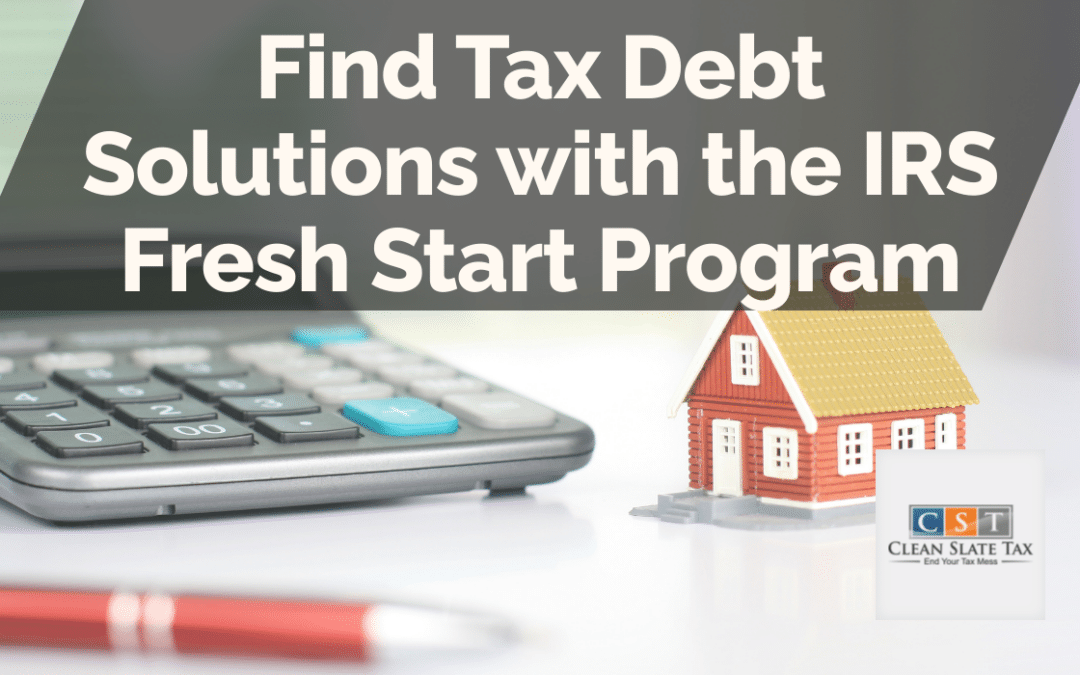Tax debt can be overwhelming, stressful and frustrating for anyone affected by it. It is quite common for individuals and businesses to fall behind on their taxes, but the consequences can be severe. The IRS is known for its strict policies and enforcement when it comes to collecting unpaid taxes. However, the IRS Fresh Start Program may be a solution for those struggling with tax debt.
What is the IRS Fresh Start Program?
The IRS Fresh Start Program was launched in 2011 as a way to help taxpayers who owe back taxes find relief. This program is designed to make it easier for individuals and businesses that are struggling with tax debt to pay back what they owe. The Fresh Start Program offers different options for tax debt relief, including installment agreements, offers in compromise, and penalty relief.
How can the Fresh Start Program help with tax debt?
The IRS offers several ways that the Fresh Start Program can help with tax debt. These options include:
- Installment Agreements: The IRS offers payment plans to help individuals and businesses pay back their tax debt in monthly payments. With the Fresh Start Program, taxpayers may be able to apply for an installment agreement without having to provide a financial statement if their balance owed is less than $50,000.
- Offer in Compromise: Taxpayers may be able to settle their tax debt for less than what they owe through an Offer in Compromise. This option allows taxpayers to make an offer to the IRS to settle their tax debt for a reduced amount.
- Penalty Relief: The Fresh Start Program also offers penalty relief for certain individuals and businesses. This means that the IRS may waive the penalties that have been added to a taxpayer’s tax debt.
Who is eligible for the Fresh Start Program?
To be eligible for the Fresh Start Program, you must meet the following criteria:
- Owe $50,000 or less in tax debt
- Demonstrate the ability to pay back the tax debt in full within six years
- File all required federal tax returns
How to apply for the Fresh Start Program?
To apply for the Fresh Start Program, you need to fill out the necessary forms and provide the required documentation. The forms you need to fill out depend on the type of relief you are seeking. For example, if you are applying for an installment agreement, you will need to fill out Form 9465.
You can apply for the Fresh Start Program by filling out the required forms yourself or by working with a tax professional. You can also apply online through the IRS website.
What are the benefits of the Fresh Start Program?
The Fresh Start Program provides several benefits, including:
- Flexible payment options
- Reduced penalties
- Ability to settle tax debt for less than what is owed
- Lower the stress and anxiety caused by tax debt
- Compliance with tax obligations
FAQs about the Fresh Start Program
How long does it take to get approved for the Fresh Start Program?
The time it takes to get approved for the Fresh Start Program depends on various factors, such as the type of relief you are seeking and the complexity of your tax situation. It could take anywhere from a few weeks to several months to get approved.
Can the Fresh Start Program help with state tax debt?
No, the Fresh Start Program only applies to federal taxes owed. However, some states may offer similar programs.
Will the IRS automatically approve me for the Fresh Start Program?
No, the IRS will review your tax situation to determine if you are eligible for the program. It’s essential to be upfront and honest about your financial situation when applying for the Fresh Start Program.
What happens if I default on my Fresh Start Program agreement?
If you default on your Fresh Start Program agreement, the IRS may take enforcement action, such as wage garnishment, levying bank accounts or other assets, or filing a tax lien.
Conclusion
If you are struggling with tax debt, the IRS Fresh Start Program may be an excellent solution for you. The program provides options for relief, including installment agreements, offers in compromise, and penalty relief. Eligibility for the program depends on various factors, such as the amount of tax debt owed and the ability to pay.





